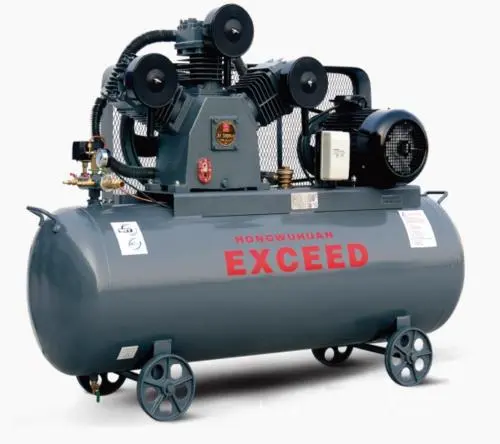Air compressors are indispensable in modern industries, workshops, and even homes. They are devices designed to convert power into potential energy stored in compressed air. This compressed air can then be used for various applications ranging from powering pneumatic tools to supplying clean air for industrial processes. In this article, we’ll dive into the primary purpose of air compressors, exploring their functionality, types, and widespread uses.
Understanding the Basics of Air Compressors
An air compressor is a mechanical device that increases the pressure of air by reducing its volume. This basic function may sound simple, but its applications are vast and integral to many sectors.
How Do Air Compressors Work?
The compressor pulls in air, compresses it to a smaller volume using mechanical energy, and stores it in a tank. This process results in high-pressure air that can be released as needed.
The working principle varies with the type of compressor. For example:
Reciprocating Compressors: Use pistons to compress air.
Rotary Screw Compressors: Employ helical screws for compression.
Centrifugal Compressors: Utilize a spinning impeller to increase air pressure.
Energy Efficiency
Compressors are energy-efficient devices because they store energy for future use. This stored energy is versatile and can power tools or processes without needing continuous electricity.
The Primary Purpose of an Air Compressor
The main purpose of an air compressor is to supply compressed air to power pneumatic tools and devices. However, this broad purpose branches out into several specific functions.
Powering Tools and Equipment
Compressed air is a critical power source for pneumatic tools such as:
- Impact wrenches
- Nail guns
- Paint sprayers
- Sandblasters
These tools are more durable, safer, and often more powerful than their electric counterparts.
Industrial Automation
In industrial settings, air compressors are the backbone of automation systems. They operate valves, actuators, and other components crucial for automated processes.
Transportation and Automotive Applications
Air compressors are integral in vehicles, particularly in:
- Braking systems in buses and trucks (air brakes).
- Inflating tires with precision.
- Operating suspension systems in heavy-duty vehicles.
Refrigeration and Cooling
Compressors are central to cooling systems, compressing refrigerants in HVAC units and refrigerators. This allows for the efficient transfer of heat and cooling.
Types of Air Compressors and Their Unique Purposes
Different types of air compressors serve distinct purposes depending on their design and capacity.
Reciprocating (Piston) Compressors
Purpose: Used in small-scale operations like workshops and garages.
Applications: Inflating tires, powering basic tools, and small industrial setups.
Rotary Screw Compressors
Purpose: Designed for continuous operation in industrial settings.
Applications: Operating machinery in manufacturing, assembly lines, and large-scale cooling systems.
Centrifugal Compressors
Purpose: High-capacity compressors for large-scale industrial use.
Applications: Petrochemical plants, power generation, and large HVAC systems.
Key Industries Benefiting from Air Compressors
Air compressors have revolutionized multiple industries by enhancing productivity, safety, and efficiency.
Manufacturing
Role: Power pneumatic tools, ensure precise machining, and aid in packaging processes.
Example: Assembly lines in automobile manufacturing rely on compressed air to run smoothly.
Construction
Role: Power heavy-duty tools such as jackhammers and drills.
Example: Portable air compressors are a common sight at construction sites.
Healthcare
Role: Provide clean, pressurized air for patient care and surgical equipment.
Example: Dental drills and ventilators depend on air compressors.
Energy Sector
Role: Compress natural gas for transport and storage.
Example: Pipeline systems use compressors to maintain gas pressure.
Benefits of Using Air Compressors
Versatility
Air compressors can adapt to various tools and applications, making them indispensable in multiple sectors.
Energy Efficiency
They consume power only during compression, allowing energy storage for intermittent use.
Safety
Compressed air-powered tools are safer in hazardous environments as they eliminate electrical risks.
Low Maintenance
Many compressors, especially rotary screw types, require minimal maintenance, enhancing their longevity and cost-effectiveness.
Innovations and Future Trends in Air Compressors
The evolution of air compressors has led to more efficient, environmentally friendly, and specialized designs.
Energy-Efficient Models
Manufacturers are focusing on reducing energy consumption with innovations such as:
- Variable Speed Drive (VSD) compressors.
- Oil-free designs for cleaner operation.
Smart Compressors
IoT-enabled compressors offer real-time monitoring, predictive maintenance, and optimized performance.
Sustainability
Eco-friendly compressors with lower carbon footprints are gaining popularity in industries aiming for sustainable operations.
Maintenance and Care for Optimal Performance
Proper maintenance is crucial for ensuring an air compressor functions efficiently and safely.
Regular Inspection
Check for leaks, wear and tear, and proper pressure levels.
Ensure filters are clean to maintain air quality.
Lubrication
Keep components well-lubricated to prevent overheating and friction-related damage.
Drain Moisture
Condensation buildup can reduce efficiency; regularly drain the tank to avoid rust and contamination.
Follow Manufacturer Guidelines
Adhering to prescribed maintenance schedules and using recommended parts can significantly extend a compressor’s lifespan.
Conclusion
The primary purpose of an air compressor is to supply compressed air for a wide range of applications. From powering tools in workshops to facilitating large-scale industrial processes, air compressors are versatile, efficient, and essential. Understanding their working principles, types, and uses not only enhances appreciation for these devices but also ensures optimal selection and maintenance.
As industries continue to innovate, air compressors will undoubtedly evolve, becoming even more efficient and sustainable, solidifying their role as a cornerstone of modern technology and industry.
Related topics:

